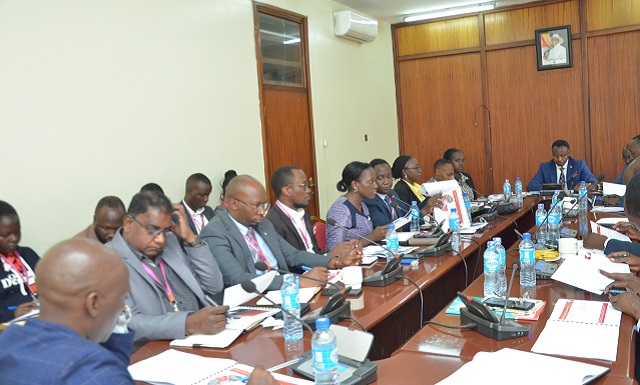
Currently, DTS costs vary significantly across the EAC, creating competitiveness challenges
Kampala, Uganda | THE INDEPENDENT | Executives from the Private Sector Foundation of Uganda (PSFU) and the Uganda Manufacturers Association (UMA) are urging East African Community (EAC) leaders to harmonize the costs of Digital Tracking Solutions (DTS), also known as Digital Tax Stamps, across the region. They argue that uniform rates will foster fair competition, stimulate demand, and support business growth. This call for action was made during a recent meeting with the Parliamentary Committee on Finance.
Currently, DTS costs vary significantly across the EAC, creating competitiveness challenges. In Uganda, DTS fees are Shs110 for wines and spirits and Shs36 for beer. In Kenya, rates are Shs134.88 for wines and spirits and Shs80.93 for beer, while Tanzania has the lowest rates with Shs51.75 for wines and spirits, Shs23.02 for locally-produced beers, and Shs27.58 for imported beers. Rwanda’s DTS rates are the highest in the region, with fees at Shs761.13 for spirits and wines and Shs152.23 for beer.
Julius Byaruhanga, a representative from PSFU, said harmonization of these costs should be manageable, as all EAC countries currently source DTS from the same supplier, SICPA. “Members of the manufacturing sector have consistently supported government initiatives like DTS implementation. However, the high fees associated with DTS significantly increase operational costs, affecting sector productivity,” Byaruhanga stated. He noted that such costs inflate product prices, potentially fueling illicit trade in Uganda’s price-sensitive market.
“All around us, especially in small local bars, we see that about 95% of alcoholic beverages are untraceable, lacking compliance labels for tax and alcoholic content,” Byaruhanga added, underscoring the need to address price-driven non-compliance.
Allan Ssenyondwa, Director of Advocacy at UMA, emphasized that different DTS costs within the EAC’s common market undermine regional competitiveness. “Harmonizing DTS rates or reducing costs across the region would benefit all EAC member states. This would help establish a level playing field, in line with the principles of a single market,” he explained.
To address the high cost of DTS, Ssenyondwa suggested inviting additional providers to offer similar solutions at more competitive rates. “Revisiting these solutions and making them cost-effective will encourage manufacturers to combat illicit trade more effectively. Additionally, it will allow businesses to expand and increase job opportunities,” he stated.
Benefits of DTS
A report presented by Juliet Nagginda, Senior Manager at PwC Uganda, highlights the burden of DTS compliance on manufacturers. According to Nagginda, “For every Shs100 of Excise Duty paid, manufacturers incur an additional Shs16 just for DTS compliance. Many cannot transfer these costs to consumers, given the market’s price sensitivity.” The report further reveals that over 30 manufacturers, many of whom operated prior to DTS, have ceased operations since its implementation, citing high operational costs among the reasons for closure.
DTS was introduced in Uganda during the 2019/20 Financial Year under the Domestic Revenue Mobilization Strategy led by the Finance Ministry. The goal was to enhance revenue collection and curb leakages. Digital stamps also ensure product authenticity, providing consumer protection and helping compliant businesses thrive by limiting counterfeit products in the market.
Government response
In a recent interview with the Daily Monitor, Moses Kagwa, Director for Economic Affairs, explained that DTS implementation incurs costs due to the need for technology setup, supervision, and stamp production. Kagwa noted that costs have been decreasing as transaction volumes increase and stated that ongoing negotiations aim to lower them further.
Amos Kankunda, Chair of the Parliamentary Committee on Finance, responded to concerns from PSFU and UMA by confirming that the committee would examine these issues and engage with the government to support greater productivity in the manufacturing sector.

















